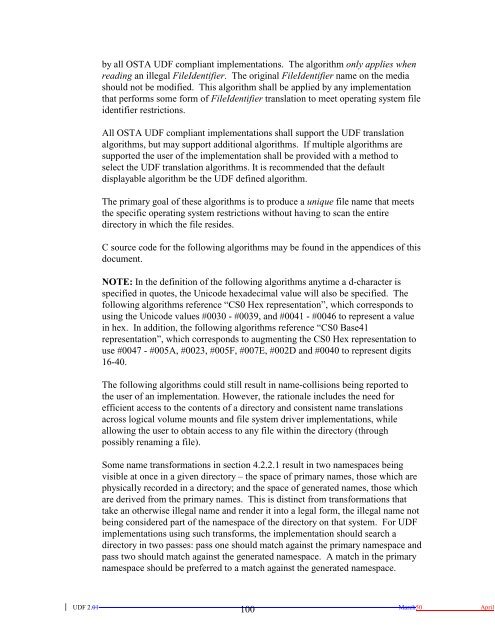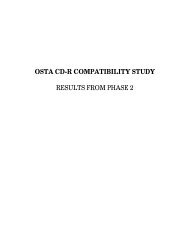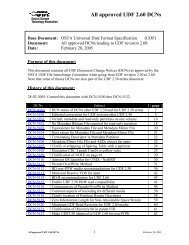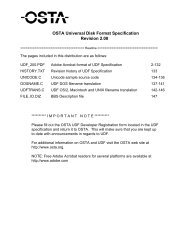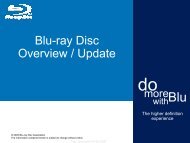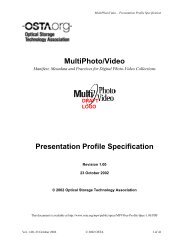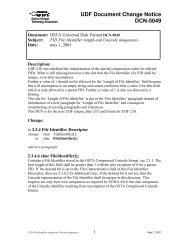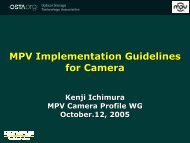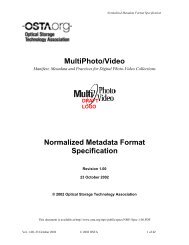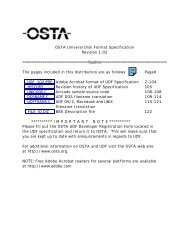here - OSTA - Optical Storage Technology Association
here - OSTA - Optical Storage Technology Association
here - OSTA - Optical Storage Technology Association
You also want an ePaper? Increase the reach of your titles
YUMPU automatically turns print PDFs into web optimized ePapers that Google loves.
y all <strong>OSTA</strong> UDF compliant implementations. The algorithm only applies when<br />
reading an illegal FileIdentifier. The original FileIdentifier name on the media<br />
should not be modified. This algorithm shall be applied by any implementation<br />
that performs some form of FileIdentifier translation to meet operating system file<br />
identifier restrictions.<br />
All <strong>OSTA</strong> UDF compliant implementations shall support the UDF translation<br />
algorithms, but may support additional algorithms. If multiple algorithms are<br />
supported the user of the implementation shall be provided with a method to<br />
select the UDF translation algorithms. It is recommended that the default<br />
displayable algorithm be the UDF defined algorithm.<br />
The primary goal of these algorithms is to produce a unique file name that meets<br />
the specific operating system restrictions without having to scan the entire<br />
directory in which the file resides.<br />
C source code for the following algorithms may be found in the appendices of this<br />
document.<br />
NOTE: In the definition of the following algorithms anytime a d-character is<br />
specified in quotes, the Unicode hexadecimal value will also be specified. The<br />
following algorithms reference “CS0 Hex representation”, which corresponds to<br />
using the Unicode values #0030 - #0039, and #0041 - #0046 to represent a value<br />
in hex. In addition, the following algorithms reference “CS0 Base41<br />
representation”, which corresponds to augmenting the CS0 Hex representation to<br />
use #0047 - #005A, #0023, #005F, #007E, #002D and #0040 to represent digits<br />
16-40.<br />
The following algorithms could still result in name-collisions being reported to<br />
the user of an implementation. However, the rationale includes the need for<br />
efficient access to the contents of a directory and consistent name translations<br />
across logical volume mounts and file system driver implementations, while<br />
allowing the user to obtain access to any file within the directory (through<br />
possibly renaming a file).<br />
Some name transformations in section 4.2.2.1 result in two namespaces being<br />
visible at once in a given directory – the space of primary names, those which are<br />
physically recorded in a directory; and the space of generated names, those which<br />
are derived from the primary names. This is distinct from transformations that<br />
take an otherwise illegal name and render it into a legal form, the illegal name not<br />
being considered part of the namespace of the directory on that system. For UDF<br />
implementations using such transforms, the implementation should search a<br />
directory in two passes: pass one should match against the primary namespace and<br />
pass two should match against the generated namespace. A match in the primary<br />
namespace should be preferred to a match against the generated namespace.<br />
UDF 2.01<br />
100<br />
March50 April


